MercoPress. South Atlantic News Agency
Environment
-
Tuesday, August 14th 2012 - 07:31 UTC
Obama announces 170m dollars emergency support for scorched farms
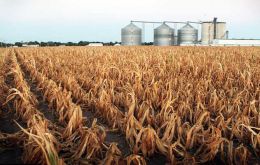
President Barack Obama announced an emergency purchase of up to 170 million dollars of meat and fish on Monday on a campaign trip to drought-hit Iowa, and accused Republican vice presidential candidate Paul Ryan of blocking disaster aid to farmers.
-
Monday, August 13th 2012 - 21:57 UTC
UN launches new initiative to protect oceans on 30th anniversary of Law of the Sea

United Nations Secretary-General Ban Ki-moon launched on Monday a new initiative to protect the oceans and the people whose livelihoods depend on it, and called on countries to work together to achieve a more sustainable management of this precious resource and address the threats it is currently facing.
-
Monday, August 13th 2012 - 05:11 UTC
Aid for US farmers stalled in Senate; proposal to reduce bio-fuel mix in gasoline
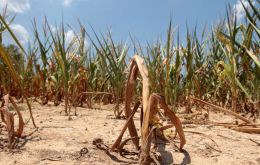
The US House of Representatives passed a 383 million dollars disaster relief bill that provides political shelter for lawmakers during the worst drought in half a century, but may not release the aid for months to come.
-
Saturday, August 11th 2012 - 11:17 UTC
US consumers face dearer pork, chicken and beef because of the drought

Pork and chicken will join beef on the menu of expensive meats as drought and US ethanol policy combine in a corn “disaster”, the head of the world’s largest pork producer has said.
-
Saturday, August 11th 2012 - 11:11 UTC
UK minister swims in tank of sharks to highlight campaign against ‘finning’
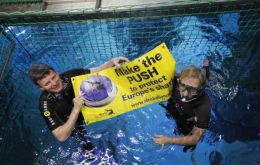
UK Fisheries minister Richard Benyon has been swimming with sharks to highlight his desire to tighten the European ban on “finning”. Mr Benyon took the plunge into a tank of sharks at Sealife London Aquarium to launch a Shark Trust initiative calling for support to close loopholes in the EU ban on slicing off shark fins and discarding the bodies at sea.
-
Friday, August 10th 2012 - 22:37 UTC
Ice patrol HMS Protector crew to visit the affiliated city of Cambridge

The university city of Cambridge might be more used to punts, but it is about to welcome the crew of a Royal Navy ship. HMS Protector, the Navy's 5.000-ton Antarctic patrol vessel is to visit the region on Monday, marking her first visit to her affiliated city of Cambridge since the formal link was established a year ago.
-
Friday, August 10th 2012 - 07:16 UTC
Volcanic pumice mass, size of Belgium floating off the coast of New Zealand
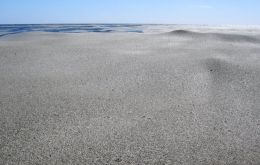
A mass of small volcanic rocks nearly the size of Belgium has been discovered floating off the coast of New Zealand, reports the Auckland media. The stretch of golf-ball-size pumice rocks was first spotted this week by a New Zealand air force plane about 1,000 kilometres northwest of Auckland.
-
Wednesday, August 8th 2012 - 06:57 UTC
Black-browed Albatross success in Falklands not reflected in South Georgia
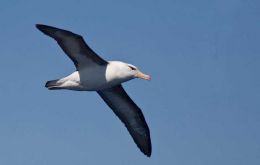
The July edition of the South Georgia Newsletter has an interesting comment on the recent announcement that the Falklands’ population of black-browed Albatross has seen a healthy increase in the number of breeding birds, information that has been submitted to BirdLife International for use in the Red List assessment process
-
Tuesday, August 7th 2012 - 15:19 UTC
Professional fishermen to catch sharks that are attacking surfers in Reunion Islands
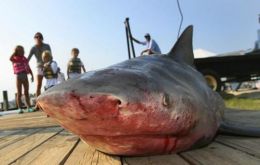
France will hire professional fishermen to kill some 20 sharks off the Indian Ocean island of Reunion this week in an effort to understand the reasons for a series of attacks in the surfing hotspot.
-
Wednesday, August 1st 2012 - 22:33 UTC
Research shows Antarctica at one time had mild weather and palms and conifers

Scientists drilling deep into the edge of modern Antarctica have pulled up proof that palm trees once grew there. Analyses of pollen and spores and the remains of tiny creatures have given a climatic picture of the early Eocene period, about 53 million years ago.
